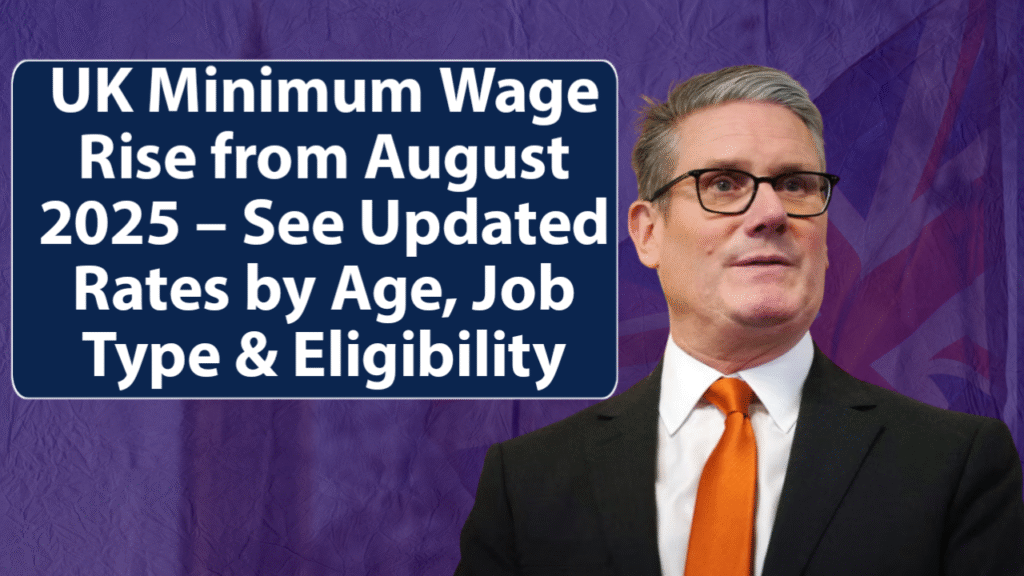The UK government has officially confirmed an increase in the National Minimum Wage starting from August 2025. This change will impact millions of workers across various sectors, offering a financial boost amid rising living costs. The updated rates are part of the government’s continued effort to support working individuals and ensure fair compensation based on age and employment category.
What Is the National Minimum Wage?
The National Minimum Wage (NMW) is the lowest pay rate employers are legally allowed to offer workers in the UK. It varies based on age and employment type. The main goal is to protect employees from unfairly low pay, especially those in low-income jobs or part-time roles.
New Minimum Wage Rates From August 2025
Starting August 1, 2025, the revised minimum wage rates will apply to workers across England, Scotland, Wales, and Northern Ireland. The updated figures are as follows:
Aged 23 and Over (National Living Wage)
The rate will increase to £11.80 per hour. This change reflects the government’s commitment to gradually increasing the National Living Wage toward the target of two-thirds of median earnings by 2026.
Aged 21 to 22
Employees aged between 21 and 22 will now receive £10.90 per hour. This brings their wage closer to parity with the National Living Wage.
Aged 18 to 20
The minimum wage for those aged 18 to 20 will be set at £8.90 per hour. This age group often includes students or those in the early stages of their careers.
Aged Under 18
Workers under 18, excluding apprentices, will earn £6.60 per hour starting in August 2025.
Apprentices
The apprentice rate, which applies to apprentices aged under 19 or in the first year of their apprenticeship, will rise to £5.50 per hour.
Why Is the Minimum Wage Increasing?
The wage increase is a response to inflationary pressures, cost of living concerns, and recommendations from the Low Pay Commission. It’s designed to ensure that UK workers maintain a reasonable standard of living without being left behind economically.
Who Benefits From the New Rates?
The new rates will benefit workers across several industries, particularly in retail, hospitality, social care, and other sectors with high numbers of minimum-wage employees. Young workers and apprentices are also set to see a notable increase in their earnings.
What Employers Need to Know
Employers are legally required to update payroll systems to reflect the new wage rates from August 1, 2025. Failure to comply with the updated wage laws could result in penalties, legal action, and public naming by HMRC.
Penalties for Non-Compliance
If employers fail to pay the correct rate, they may face fines of up to 200% of the underpayment amount, with a maximum fine of £20,000 per worker. HMRC also has the authority to name and shame offending companies.
How Workers Can Check Their Pay
Workers who believe they are not being paid the correct rate can report their employer to HMRC anonymously. The government also offers an online calculator to help workers check if their wage meets the legal minimum.
Impact on Benefits and Tax Credits
A higher wage could affect eligibility for certain benefits, including Universal Credit and Working Tax Credit. However, in most cases, the increased income offsets any reduction in benefits. Workers are advised to use government calculators or speak to advisors to understand their specific situations.
Tips for Workers and Job Seekers
If you are entering the job market or negotiating a new contract, make sure to check the latest wage rates applicable to your age and role. Always review your payslips to confirm you’re receiving the correct amount.
How This Affects Different Job Sectors
Sectors like hospitality, childcare, warehousing, and retail will see the largest impact. Employers in these areas may need to adjust budgets and staffing to accommodate higher wage bills.
Support for Small Businesses
The government may offer support to small businesses struggling with the increased wage bill. Business owners should check for regional grants, tax reliefs, or advisory services that can help them comply without financial strain.
How to Prepare for the Change
Employers should:
- Update contracts
- Adjust payroll systems
- Train HR and payroll staff
- Inform employees about their new pay
Workers should:
- Stay informed
- Review their payslips
- Know their rights
- Seek help if underpaid
Final Thoughts
The minimum wage increase in August 2025 is a significant step toward economic fairness. It ensures that all workers receive a wage that better reflects the cost of living in the UK. While it brings challenges for employers, particularly small businesses, it also fosters a more equitable work environment and helps reduce poverty across the country.
For the most accurate and personalized advice, both workers and employers should consult official UK government resources or speak to employment specialists.
